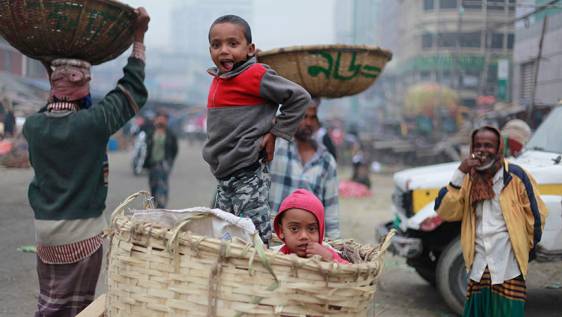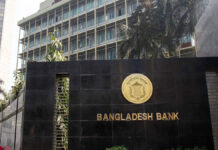The One House One Farm project has failed to encourage people to set up small farms
Five years into existence, the government’s “Ektee Bari Ektee Khamar” project has deviated from one of its primary objectives of poverty alleviation, with the actual poor being ignored in many areas.
The Dhaka Tribune, through its district correspondents, studied the structures of membership and operation of 11 village-level cooperative associations under the project and found evidence that many rich people have been included in the project.
The 60-member cooperative associations collect Tk200 as monthly member subscription. The money is used to create a fund that is used for disbursing small loans among the members. The government, too, contributes heavily to these funds.
As of August, a total of 38,093 cooperative associations have been set up in the 64 districts around the country under the “one house one farm” project.
These local bodies, together with the government’s contribution, have so far developed around Tk2,000 crore funds. The government is likely to open a Palli Sanchay Bank – a rural savings – with this fund.
The core aim of the government is alleviating poverty and promoting sustainable development by providing capital formation assistance to poor farming families and sharpening their skills to form associations.
Women, owning from 0.50 acres up to one acre of land, including homestead, are in line to be the primary beneficiaries.
Project officials have, however, admitted that weak monitoring and management have led to many rich people, using political connections, replacing the deserving poor in many villages.
For instance, in the 60-member association in Kathi Maddha Para village in Gopalganj district, one member owns nearly 17 acres of arable land, three members with more than 8 acres each, another possessing nearly 7 acres and three own 5 acres of arable land. Their monthly incomes range from Tk15,000 to Tk3 lakh.
Our Gopalganj correspondent reports that families with the highest monthly income have one or two members working abroad.
Of the cooperative association’s 60 members in the Bhandaru village of Panchagarh district, there are at least eight who own from 1.67 to 10 acres of arable land, having a monthly income from Tk10,000 to Tk15,000.
In Meergarh village of the same district, the chairman of the cooperatives association, being the local union parishad chairman’s brother, lives in a concrete house, owns at least 1.67 acres of arable land with a monthly income not less than Tk10,000. Another member owns more than 3 acres of land. His three sons are government employees.
When contacted, Rezaul Islam, project coordinator of Panchagarh Sadar upazila, said he was not in charge when the associations were formed in 2009.
“I cannot say how solvent people became members. We cannot exclude them right now because they are very influential. They have also taken loans from the association and cannot be removed until the loans are repaid,” he said.
At the upazila level, a local committee, headed by the government’s upazila executive officer, selects the villages to be brought under the project.
At the village level, another local committee, led by another government employee and highly regarded local people, select members for the cooperative association.
The committees are said to select the members on a consensus reached through discussions on the eligibility of the applicants.
After an association is formed, an 11-member managing committee to look after the overall operation of the association is elected.
The Dhaka Tribune correspondents have found some villages where association members have taken loans from the project but have not set up farms at home. These were mainly the families who already had fixed sources of income and are politically influential in their areas.
For example, in Kaichchabari village of Gazipur district, Abeda Khatun, whose husband is a government employee, Arifa Akhter, whose husband is a migrant worker, and Jyotsna Begum, whose husband owns a grocery store – all housewives – have taken loans, but none have any farm at home.
Our Gazipur correspondent also visited several houses of beneficiaries in Bashbari village and did not find any farms. Maleka Begum, manager of the local association, said only five to seven of the 60 members set up farms with the loans.
Afzal Hossain Molla, project coordinator of Sreepur upazila who looks after 72 associations, said: “There is no denying the fact that there are irregularities, but those are not serious. When an influential person becomes a member, poor people get the confidence to join in.”
Seeking anonymity, a schoolteacher from Kulbaria village, Meherpur, told the Dhaka Tribune that the objective of the project had been hampered because of the favouritism shown by the politically influential people.
Alamgir Kabir, project coordinator of Meherpur Sadar upazila, said: “The local selection committee sat together and scrutinised the credentials of the applications to come up with the final lists of members.”
He also said: “In order to keep everything under control, one or two solvent and influential people must be included in the association. We have already disbursed Tk9 crore as loans in my upazila and the rate of redemption is nearly 70%.”
Proshanta Kumar Roy, director, Ektee Bari Ektee Khamar project, said they had identified that the ultra-poor were being left out six months ago.
He said they had already launched a pilot project in Kishoreganj and Nilphamari districts to accommodate and rehabilitate the ultra-poor, especially the beggars.
He admitted that there had been a lack of monitoring. “There was no monitoring mechanism in place. That is why, only about 60% of the beneficiaries successfully utilised the loans. But now we are appointing officers to every union to monitor the actions.”
Proshanta also said: “When the project was first launched, there were political influences and some rich people became members.
“The problem was with the previous criterion which said someone with 0.5 acres of land could become a member. We have changed that provision. Some people have also tried to make some money at the expense of the project.”
The five-year Ektee Bari Ektee Khamar project was launched in July 2009 with a cost estimation of Tk1,197 crore. Later, the duration of the
project was extended by two years and the cost estimation revised to Tk3,163 crore.
Our correspondents from the districts of Panchagarh, Gopalganj, Gazipur, Barisal, Natore, Narail, Meherpur, Faridpur, Kishoreganj, Sunamganj and Bogra collected the data for this report.
Source: Dhaka Tribune










